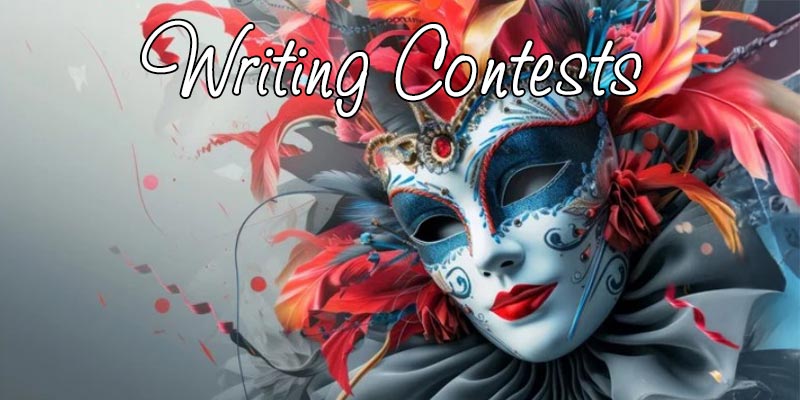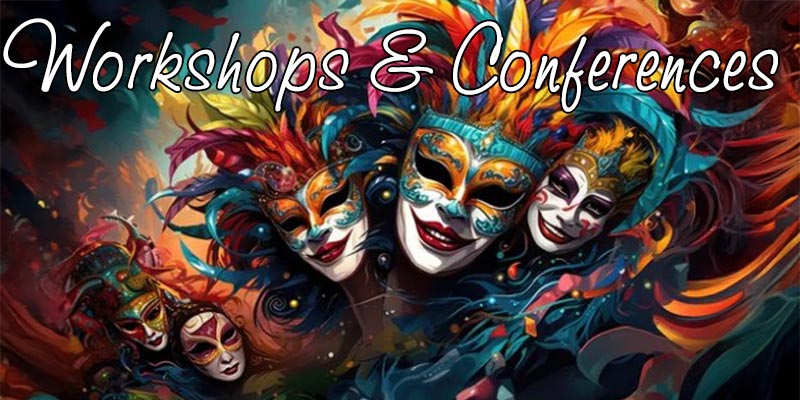
The site for writers of all genre, and the readers who love them. Find what you want to know.
Knowing and Finding Your Voice

Finding your true writing voice is a lot like falling in love — you know it when it happens. Until then, you bumble along, trying this style and that, wondering if this is it or if a better voice is out there just waiting for you. You question and doubt, reaching nearly the point of despair before finally, your true voice comes to you and you know exactly who you are as a writer.
A few tricks exist to help you know and find your voice. Don’t expect this to just fall into your lap–it takes real listening and exploration of yourself as a writer before your voice manifests itself.
FIND IT IN OTHERS
Read widely, across genres, picking and choosing authors who are distinctive. Some authors tend to have very little voice, and it’s difficult to tell their books from others. But if you read a Stephen King and compare that to a Dean Koontz, you’ll see definite differences in style, pattern and manner of writing. All these things, combined with an echoing premise (see below), create a voice. Jenny Crusie has a distinctive comedic voice that is very different from Stephanie Bond’s.
LaVyrle Spencer’s voice was more melodic and emotional, far different from the fast-paced Iris Johansen or the hard-hitting Suzanne Brockmann. What takes a bit more skill is telling similarly-voiced authors apart. How does Vicki Hinze differ from Suzanne or Merline Lovelace? All cover military-based novels, but each with her own voice. If you can pick up a book, open it randomly and immediately know the author without looking at the jacket, then you have discovered that person’s voice.
EXAMINE THE PARTICULARS
Another thing that sets one author’s voice apart from another’s is the level of language, the structure of the sentences and the type of verbiage chosen. Obviously, a Regency author has a much different tone from a contemporary Blaze author. Some authors, like Jayne Ann Krentz, change their voice to fit the period of their novels. Underneath it all, however, the basic sound of a Jayne/Amanda Quick novel is the same. It’s what makes her novels unique to her.
DETERMINE YOUR STRENGTHS
All authors who have a voice make the most of it by capitalizing on their strengths. For some, it’s dialogue; for others, emotional descriptions. In your own work, you are better at one thing than another. If it’s humor, then comedy is part of your voice. If it’s drama, then that is a part of your voice.
FIND YOUR AUTHOR THEME
This is something Vicki Hinze has talked about before in her newsletter, AIDS4WRITERS. All authors, whether they realize it or not, have a common theme running through their work, whether it’s the strength of love, the theme of redemption, the saving power of truth, etc. Your theme is part of your fingerprint on your work and is part of what makes your writing sound uniquely yours.
READ OUT LOUD
Finding and knowing your voice requires listening, not just to the words in your head as you read your work silently, but to how it sounds when spoken aloud. Do you have a lot of witty repartee? A number of pauses or shortened sentences? How does your spoken work leave you feeling? All of these are elements of your voice.
When you find your authentic voice, it’s like stepping into a comfortable pair of shoes. The rhythm and pacing of your words feel right, as if they’re meant just for you. That’s not to say that writing gets a whole lot easier, just that it feels more natural. You’ll still be dragging those words, kicking and screaming, some days, but they will finally be the ones that only you could have written.
AGENTS & EDITORS
- Agents: Knowing When To Hold One and When To Fold
- Copyright Primer, Know Your Rights
- Getting Offers from Multiple Literary Agents
- Landing An Agent Elements Of A Winning Query
- Literary Agents List
- Preditors and Editors
- Publishing, Writing Terms, Acronyms
- Tips for a Successful Editor Appointment
- Want More? Here’s How to Get It
- What NOT to Do When Beginning Your Novel
- Windup for the (Story) Pitch
- Write the Perfect Book Proposal
CALLS FOR SUBMISSIONS
![]()
CALLS FOR SUBMISSIONS MAIN PAGE
- 2026 FEB Calls for Submissions
- 2026 JAN Calls for Submissions
- 2025 DEC Calls for Submissions
- 2025 NOV Calls for Submissions
- 2025 OCT Calls for Submissions
- 2025 SEP Calls for Submission
- 2025 AUG Calls for Submission
- 2025 JUL Calls for Submission
- 2025 JUN Calls for Submission
- 2025 MAY Calls for Submission
- 2025 APR Calls for Submission
- 2025 MAR Calls for Submission
- 2025 FEB Calls for Submission
CHARACTERIZATION
CONFLICT
DIALOGUE
GRAMMAR & FORMATTING
![]()
GRAMMAR & FORMATTING MAIN PAGE
- Achieving 250 Words / 25 Lines Per Page
- And Sammy, Too? Oh, No!
- Changing Double Hyphens to EM Dashes in Word
- Edit Easier
- High Hopes–Avoiding Common Mistakes
- Misused Words
- Navigating In Your Novel
- Proofreaders Marks
- Research Links
- Rules for Writers
- Slang and Jargon Souces
- Tightening Your Manuscript and Trimming the Word Count
JOBS / MARKETS
- 3 Ways to Make Your Non-Fiction Article Pitch Stand Out
- 35 Online Work Ideas to Earn Good Money Whilst Studying
- An Interview with Holly Ambrose
- Beyond the Basics
- Copyright Primer, Know Your Rights
- Finding Markets Fiction and Nonfiction
- Freelance Writing 101
- Getting Offers from Multiple Literary Agents
- How To Market Your Book After You’ve Written It
- How to Write a Novel Synopsis
- How To Write Your Own Press Releases
- Magazine Links
- Making Money As a Corporate Freelancer
- Market News–All Genres
- Need a Clip? Open a Newspaper
- Newspaper Writing Resources
- Publisher’s Websites
- Selling to Children’s Markets
- Submitting to UK Markets
- Syndication 101
- the Power of the Press
- To Specialize, or Not to Specialize?
- Ultimate Guide to Being a Freelancer 2025 Update
- What Are Your Chances of Getting Published?
- Why Article Writing Should Be A Part Of Your Career Development Strategy
- Why E-Books?
- Write the Perfect Book Proposal
- Write Your Way to $1000 a Month
- Youth Writing Markets
PLOTTING
- 3 Ways to Know When to End Your Chapters
- 7 Excellent Plotting Tips from Agatha Christie
- 7 Ways to Add Great Subplots to Your Novel
- 8 Best Writing Tips to Become a Best Storyteller
- Does Your Plot Need a Subplot?
- Love to Write: Here Is How You Can Build Your Career
- Slang and Jargon Souces
- The All Purpose Plot
- Turning Points and Plot Points in Storytelling
- What NOT to Do When Beginning Your Novel
- Writing the Novel by the Numbers
POINT OF VIEW
QUERIES & PROPOSALS
- Agents: Knowing When To Hold One and When To Fold
- Getting Offers from Multiple Literary Agents
- How to Write a Novel Synopsis
- Landing An Agent Elements Of A Winning Query
- Path to Self-Publishing Success
- Publisher’s Websites
- Publishing, Writing Terms, Acronyms
- Science & Science Fiction Writing Organizations
- Submission Tracking
- Surviving a Book Proposal
- Windup for the (Story) Pitch
- Write the Perfect Book Proposal
- Writing a Synopsis & Query Letter
SUBMISSIONS
- Agents: Knowing When To Hold One and When To Fold
- An Interview with Jack Fisher
- Copyright Primer, Know Your Rights
- EBooks-Fears to Possibilities
- How to Write a Novel Synopsis
- Literary Agents List
- Path to Self-Publishing Success
- Publisher’s Websites
- Publishing, Writing Terms, Acronyms
- Science & Science Fiction Writing Organizations
- Selling to Children’s Markets
- Submission Tracking
- Surviving a Book Proposal
- What Are Your Chances of Getting Published?
- Write Your Way to $1000 a Month
- Writing a Synopsis & Query Letter
- Youth Writing Markets
SYNOPSIS
TIP SHEETS & GUIDELINES
![]()
TIP SHEETS & GUIDELINES MAIN PAGE
- Achieving 250 Words / 25 Lines Per Page
- Changing Double Hyphens to EM Dashes in Word
- Copyright Primer, Know Your Rights
- How To Write Your Own Press Releases
- Knowing and Finding Your Voice
- Plan for Success
- Publisher’s Websites
- Science & Science Fiction Writing Organizations
- What NOT to Do When Beginning Your Novel
- Why E-Books?
- Working with a Critique Group
WORKSHOPS & CONFERENCES
WRITING CONTESTS
![]()
ABOUT WRITING CONTESTS
- A Guide to Assessing Writing Contests
- Writer’s Conferences Do You Really Need To Attend?
- Writing Groups List
- 2026 FEB Writing Contests
- 2026 JAN Writing Contests
- 2025 DEC Writing Contests
- 2025 NOV Writing Contests
- 2025 OCT Writing Contests
- 2025 SEP Writing Contests
- 2025 AUG Writing Contests
- 2025 JUL Writing Contests
- 2025 JUN Writing Contests
- 2025 MAY Writing Contests
- 2025 APR Writing Contests
- 2025 MAR Writing Contests





